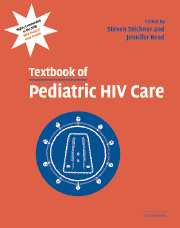Book contents
- Frontmatter
- Contents
- List of contributors
- List of abbreviations
- Foreword
- Preface
- Introduction
- Part I Scientific basis of pediatric HIV care
- Part II General issues in the care of pediatric HIV patients
- Part III Antiretroviral therapy
- Part IV Clinical manifestations of HIV infection in children
- Part V Infectious problems in pediatric HIV disease
- Part VI Medical, social, and legal issues
- 43 Clinical trials for HIV-infected children
- 44 Medical issues related to the care for HIV-infected children in the home, day care, school, and community
- 45 Contact with social service agencies
- 46 Disclosure
- 47 Psychosocial factors associated with childhood bereavement and grief
- 48 Legal issues for HIV-infected children
- Appendices
- Index
- Plate section
- References
47 - Psychosocial factors associated with childhood bereavement and grief
from Part VI - Medical, social, and legal issues
Published online by Cambridge University Press: 03 February 2010
- Frontmatter
- Contents
- List of contributors
- List of abbreviations
- Foreword
- Preface
- Introduction
- Part I Scientific basis of pediatric HIV care
- Part II General issues in the care of pediatric HIV patients
- Part III Antiretroviral therapy
- Part IV Clinical manifestations of HIV infection in children
- Part V Infectious problems in pediatric HIV disease
- Part VI Medical, social, and legal issues
- 43 Clinical trials for HIV-infected children
- 44 Medical issues related to the care for HIV-infected children in the home, day care, school, and community
- 45 Contact with social service agencies
- 46 Disclosure
- 47 Psychosocial factors associated with childhood bereavement and grief
- 48 Legal issues for HIV-infected children
- Appendices
- Index
- Plate section
- References
Summary
While recentadvances in the treatment of HIV disease have resulted in dramatic reductions in morbidity and mortality in the USA [1], in many countries in the Far East and parts of Africa, the aftermath of high AIDS-related mortality has moved the HIV/AIDS epidemic beyond a health crisis. Disruptions to work patterns caused by absenteeism due to illness and funerals, the lack of physical space in morgues and burial grounds, reach deep into everyday life, and are a constant reminder of the fatal nature of this disease [2]. Populations are trying to exist in a state of daily and ongoing loss.
The number of individuals who have lost friends, parents, children, and other family members remains vast. For each individual infected with the disease, many more are affected by the loss associated with HIV/AIDS, including children, parents, siblings, and caregivers. Individuals vary greatly in ways that they cope with loss and death, depending on their attachment to the deceased, their past experiences of death, and their developmental stage.
Bereavement is one of the most frequent and potent life stressors occurring to individuals infected with or affected by HIV [3]. Bereavement related to HIV differs from grief related to other chronic illnesses mainly in that those affected by the epidemic are typically exposed to multiple losses over a relatively short period of time, decreasing the likelihood that there will be adequate time to process and mourn the loss prior to the next death.
- Type
- Chapter
- Information
- Textbook of Pediatric HIV Care , pp. 666 - 676Publisher: Cambridge University PressPrint publication year: 2005



